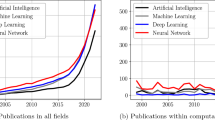
Overview
- Introduces to the adaption of learning-based methods in the domain of computational mechanics
- Presents fundamental concepts of Machine Learning, Neural Networks and their corresponding algorithms
- Reviews Machine Learning applications in Engineering and Physics and presents physics-enriched Deep Learning models
Part of the book series: Studies in Computational Intelligence (SCI, volume 977)
Access this book
Tax calculation will be finalised at checkout
Other ways to access
About this book
This book provides a first course on deep learning in computational mechanics. The book starts with a short introduction to machine learning’s fundamental concepts before neural networks are explained thoroughly. It then provides an overview of current topics in physics and engineering, setting the stage for the book’s main topics: physics-informed neural networks and the deep energy method.
The idea of the book is to provide the basic concepts in a mathematically sound manner and yet to stay as simple as possible. To achieve this goal, mostly one-dimensional examples are investigated, such as approximating functions by neural networks or the simulation of the temperature’s evolution in a one-dimensional bar.
Each chapter contains examples and exercises which are either solved analytically or in PyTorch, an open-source machine learning framework for python.
Similar content being viewed by others
Keywords
Table of contents (6 chapters)
Authors and Affiliations
About the authors
Davide D’Angella grew up in a small Italian peninsula dividing the Venetian Lagoon from the Adriatic Sea. After his high-school graduation, being firmly convinced he did not want to study any longer, he worked a couple of years as a computer programmer. This experience made him eagerto deepen his theoretical understanding of the subject, giving him the motivation to continue his studies. He headed to the University of Milan, where he obtained a bachelor’s degree in computer science. After a short Au Pair experience in Germany, he moved to Munich, where he got his master’s degree in Computational Science and Engineering at the Technical University of Munich. Davide is now a research associate and Ph.D. candidate at the same university in the research group Simulation in Applied Mechanics at the chair of Computational Modeling and Simulation.
As a product of the “Mauerfall”, Moritz Jokeit grew up in the non-existing town of Bielefeld and the alpine foothills near Rosenheim. Following his bachelor’s degree in Civil Engineering, he studied Computational Mechanics at the Technical University of Munich (TUM) and the Polytechnic University of Catalonia (UPC). His passion for deep learning and computational mechanics was transformed into a master thesis thatlaid the groundwork for this lecture book. After his graduation he continued his research at the Chair of Computational Modeling and Simulation. He is now a doctoral candidate at the Institute for Biomechanics at the ETH Zürich.
Leon Herrmann has a very diverse background, born in South Africa and growing up in seven different countries. He did his bachelor studies in Mechanical Engineering at the Technical University of Denmark (DTU) and then continued his studies in Computational Mechanics at the Technical University of Munich (TUM). Additionally, being a part of the Bavarian Graduate School of Engineering (BGCE) provided him with important insights into the academic world, which he is very grateful for. His main study and research focus has been in finite element methods and the simulation of fracture in composite materials. He is now working in the field of artificial intelligence in computational mechanics.
Bibliographic Information
Book Title: Deep Learning in Computational Mechanics
Book Subtitle: An Introductory Course
Authors: Stefan Kollmannsberger, Davide D'Angella, Moritz Jokeit, Leon Herrmann
Series Title: Studies in Computational Intelligence
DOI: https://doi.org/10.1007/978-3-030-76587-3
Publisher: Springer Cham
eBook Packages: Intelligent Technologies and Robotics, Intelligent Technologies and Robotics (R0)
Copyright Information: The Editor(s) (if applicable) and The Author(s), under exclusive license to Springer Nature Switzerland AG 2021
Hardcover ISBN: 978-3-030-76586-6Published: 06 August 2021
Softcover ISBN: 978-3-030-76589-7Published: 07 August 2022
eBook ISBN: 978-3-030-76587-3Published: 05 August 2021
Series ISSN: 1860-949X
Series E-ISSN: 1860-9503
Edition Number: 1
Number of Pages: VI, 104
Number of Illustrations: 19 b/w illustrations, 22 illustrations in colour
Topics: Computational Intelligence, Machine Learning, Engineering Thermodynamics, Heat and Mass Transfer



